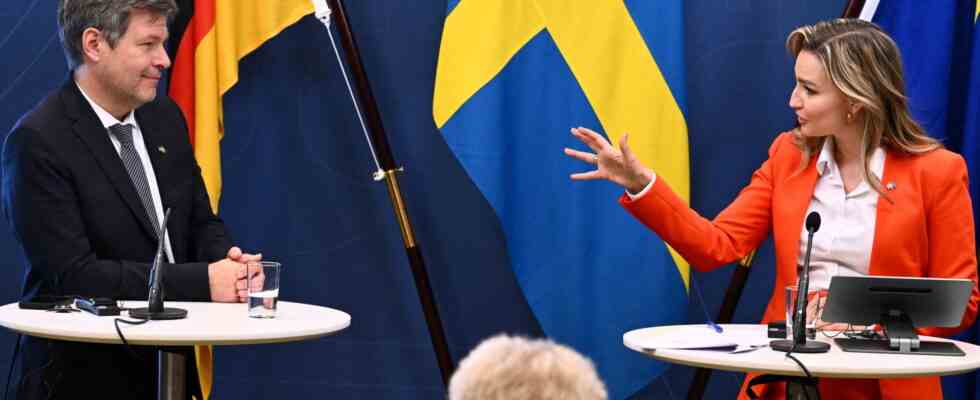Status: 02/02/2023 4:09 p.m
Economics Minister Habeck advises in Sweden, above all, on the EU’s reaction to the “Inflation Reduction Act”: The US government is investing billions in climate protection – but could also withdraw investments from Europe.
The Northvolt company, for example, could become part of a subsidy race between Europe and the USA. Nine months ago, the Swedish manufacturer of batteries for electric cars announced that it would build a large plant in the Schleswig-Holstein Heath – with at least 3,000 jobs. But the project is on hold. Because in the USA there are now considerable subsidies if Northvolt were to invest there. And now the Swedes are pointing out that the “framework conditions have to be right” in Heide.
Europe is looking for an answer
Economics Minister Robert Habeck says shortly before his departure for Stockholm that it is true that the US government’s “Inflation Reduction Act” (IRA) has opened up the investment decision again. “However, we have intensive contacts with Northvolt. I am in regular contact with the CEO and explain the advantages of the Heide location.”
Habeck’s two-day visit to Sweden isn’t just about Northvolt. Sweden took over the EU Council Presidency in January. Europe is currently struggling to find an answer to the Americans’ “Inflation Reduction Act,” with which the United States is providing a total of $370 billion – among other things to support and also attract climate-friendly future technologies. A kind of “America first” with a climate component.
Habeck welcomes von der Leyen’s EU plans
The EU Commission has just submitted proposals as to what the European response could look like. Rules for state aid to companies are to be relaxed: fewer restrictions, more money, faster approvals. Funds could flow from various billion-dollar pots such as the Corona Aid Fund so that more investments are also made in green industries in Europe. EU Commission President Ursula von der Leyen presented her proposals yesterday in Brussels. The Green Economics Minister Habeck – as well as Chancellor Olaf Scholz from the SPD – is in principle very much in favor:
Overall, I think this is ambitious and good, and it has my full support. We need to speed up the process. We must be able to fund mass production in order to produce solar systems, electrolyzers, renewable energies in all forms in Europe.
Habeck said he was campaigning in Sweden for the Council Presidency to support this approach. “We have to do the pragmatic.” Tax breaks for investments could also be a strong answer.
There is still no agreement among the EU countries
But there is still a lot to be clarified in the EU. Smaller countries such as Ireland, Austria and Finland fear that if the state aid regulations are relaxed they will not be able to keep up financially with Germany or France. The countries threatened to outdo each other.
After talking to Habeck, Swedish Economics Minister Ebba Busch emphasized that through the Council Presidency she must endeavor to take all EU countries into account. The tone of the Swedish Christian Democrats is quite different from Habeck’s. The common market was developed 30 years ago to strengthen competition. This is also one of the priorities of the Swedish Council Presidency, the country is traditionally strongly oriented towards free trade.
According to Busch, the USA would jeopardize the same competitive conditions with the IRA. “But the best way to respond is not to have a trade war with the US or a subsidy race where each member country acts on its own.” The central idea of the EU is to give a common and intelligent answer. However, the Swedish Minister for Economic Affairs leaves it open what this could look like. There is now a discussion process based on the proposals of the EU Commission.
Economic war should be avoided
Habeck’s visit to Sweden is primarily used for voting. On Monday, the Secretary of Commerce travels to Washington. On Tuesday, together with French Economics Minister Bruno Le Maire, he wants to explain what a European reaction to the IRA could look like. And they want to find out how an economic war with the USA can be avoided – at a time when a common strategy towards China is also needed. At the end of next week, the EU summit will also deal with the answer to the IRA.
In Sweden, Habeck will visit Northvolt’s research facility west of Stockholm tomorrow to find out how good the chances are for the plant in Heide – in view of the threatening subsidy race. “I think Northvolt is still open to this location,” said Habeck. The decision will be made in the first quarter. That’s why he wants to talk about how suitable the Heide location is during the visit. But he will also talk about “what Germany is willing to do to make this location possible.”
Economics Minister Habeck travels to Sweden
Martin Polansky, ARD Berlin, 02/02/2023 3:56 p.m

